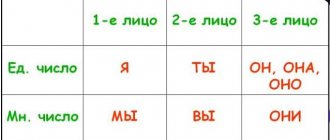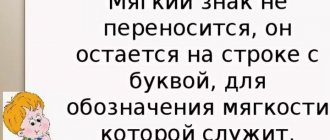Download material
so UNT / Tests / Tests in the Russian language
Test on the topic “Communion”
08.09.2011 40296 2819
Test on the topic “Communion”.
Theoretical block.
1. Find the correct statements.
1. Passive participles denote the attribute of an object that is exposed to influence from the outside.
2. Active participles themselves perform the action.
3. Transitive verbs form only passive participles.
4 In active past participles, the same vowel is written before the suffix ВШ as in the infinitive form of the verb.
5. In the passive participles of the present tense, the suffix EM, OM is written if the participle is formed from a verb of 1 conjugation.
6. Active participles have a full and a short form.
7. In modern Russian, words with the suffixes УЧ, УЧ are participles.
8. Active past participles are formed from the stem of past tense verbs using the suffixes ВШ, Ш.
9. In real participles of the present tense, the suffix УШ, УШЧ is written if the participle is formed from a verb of the 1st conjugation. The suffix АШ, ЯШ is written if the participle is formed from a verb of 2 conjugations.
10. Intransitive verbs form only active participles.
11. The active participles of the present tense are formed from the stem of the infinitive using the suffixes УШ, УШЧ, АШЧ, ЯШЧ.
12. Present passive participles are formed from the stem of transitive and intransitive present tense verbs.
13. Passive past participles are formed using the suffixes ENN, T, ANN, NN.
14. In the suffix of passive participles, O is written under stress, and E is written without stress.
15. If the stem of the verb includes the suffix I, then when forming passive past participles it is omitted and the suffix ENN is added.
16. If the words COMPLETELY, EXTREMELY belong to the participle, then the participle with NOT is always written separately.
17. If the participle is short, then NOT is written together with the participle.
18. If dependent words belong to the participle, then NOT is written separately with the participle.
19. In the words clever...y, unexpected...yy, early...yy one N is written.
20. In nouns formed from passive participles, NN is written.
2. Perform syntactic analysis of the sentence.
The tourists headed towards the river, sparkling in the distance like a shiny ribbon.
3. Carry out a morphological analysis of the participle SPARKAVSHAYA from the sentence of task No. 2.
Practical block.
1.Insert the missing letters into the participle suffixes.
An overheard conversation, a deflated barrel, shot ducks, shot cartridges scattered by the wind, a built house, a nurtured child.
Hesitating..my, illuminated..my, audible..my, recommended..my, dormant..moving, creeping..sweeping, clapping, struggling..sweeping, ticking..sweeping, building..
2. Open the brackets, choosing a combined or separate spelling NOT with participles.
(Not) a forgettable feat; (not) mown meadow; (not) completed order;
the task is (not) solved, but just begun; the enemy (not) detected; (not) corrected error on time; (not) plowed field; the novel is (not) completed; (not) compressed rye; the telephone is (not) repaired; work not yet (not) completed; (not) passable forests; (unforgettable impression;
(not) transparent twilight; (not) visible sun; (not) illuminated by the sun.
3.Insert N or NN into participles and verbal adjectives.
Forged sword, fettered movements, loud, smart, unexpected, praised, decisive, unheard, spoiled, shot, invisible, unexpected . , boiled..., wounded, wounded, wounded in the hand, loaded, overloaded, loaded with stone, seriously wounded, painted floor , unpainted floor, painted... floor, painted floor..., painted. brushed floor.
4. Place punctuation marks for participial phrases. Highlight participial phrases and defined words.
Dropping ripe acorns on the ground, he stands at the edge of the forest.
The leaves that have fallen from the trees rustle underfoot.
The dinner, which lasted about three hours, was over.
The buds that appeared on the trees spoke of spring that had come unexpectedly.
Thick icicles hanging from the roof thawed in the sun.
ADDITIONALLY!
IN
stone..thrown..om, never painted..om, unbleached..om, unclean..ohm, given..to her in the dowry of the old..castle, a clever..niece..found the forging.. th chest, glass beads. On the sandy deserted shore there are hanging nets. Broken wooden boats and torn gear were abandoned unattended.
See the downloadable file for the full text of the material.
The page contains only a fragment of the material.
Russian language, test, participle
Test in the Russian language in the form of the Unified State Exam on the topic “Communion” (grade 7)
Test on the topic “Communion” (test in Unified State Exam format)
Option 1.
Instructions for students
Before you is a test in the Russian language. It consists of 3 parts (A, B, C).
The first part A consists of test tasks. Each test task contains a question to which four answers are given. Only one out of four answers is correct. Read the question carefully and choose the correct answer. Write down the number of this answer on the card next to the question number.
Type B tasks do not contain answers. Do them yourself. Write down your answer in words or sentence number.
Task C is creative work. First, you need to answer the questions posed in the assignment, and then write an essay of at least 5-6 sentences.
Part 1.
Read sentences A, B, C, D and complete tasks A1-A6.
A. Mountain roads and paths were covered with deep snow.
B. Once in the Pamir mountains, a group of horsemen was caught by a strong hurricane.
B. As soon as the hurricane died down they set off.
G. The horsemen were forced to wait out the bad weather.
A1. In what order should the sentences be arranged to form a coherent text?
- A, B, C, D 2. A, B, B, D 3. A, G, B, C 4. B, A, D, C.
A2. Which sentence has a punctuation error?
1.A 2.B 3.C 4.D
A3. Which word from this text is incorrectly identified as belonging to one or another part of speech?
- Horsemen - noun
- Listed – short adjective
- Once - adverb
- Moved - verb
A4. Indicate the correct characteristic of sentence A.
- Compound
- Narrative, simple, common
- Declarative, non-exclamatory, simple, complicated by homogeneous parts of the sentence
- Complex
A5. What combination of words is the grammatical basis in sentence B?
- Found a group of horsemen
- Caught by a strong hurricane
- One day I found
- Caught by a hurricane
A6. Which answer option correctly identifies all sentences that contain short participles?
- A, G. 2. A 3. C 4. A, B, D
A7. In which word is the letter denoting the stressed vowel sound correctly highlighted?
- AWARDED
- Created
- Slanted
- Ringing
A8. In which answer option is the vowel e written in place of the gap in all words?
- Protected..my, washed..my, parted..dissolved
- Put to sleep..my, glued..my, oveva..my
- Embittered..abandoned..my, read..my
- abandoned, called..my, seen..
A9. Which answer option has the same letter missing?
- To the blooming acacia, about the coming autumn, in front of the collapsed building
- To a smiling girl on a bus that pulled up, about a brilliant talent
- About the exam that took place, about the squad that fought, in front of the opening window
- Pieces of fragrant fish, in a blue robe, with a charming sound
A10. In which answer option is the same vowel missing in all words?
- Red...shiny, fluctuating...green...
- Waving, hearing, rumbling
- Alternating..flowing, feeling..creeping, creeping..
- Drum...moving, marching...foaming
A11. Which word has -n- written in place of a blank?
- Beveled
- Obstructed
- Write..a
- unlit
12. In which answer option is NOT- written separately with all words?
- Books (un)folded, (untouched) snow, (not)slept child in the morning
- (Un)touched snow, (un)questioning look, still (un)finished path
- Work (not) completed on time, windows (not) washed, book (not) read, but skimmed
- (Not) blazing sun, (not) visible against the background of the forest, (not) indignant exclamation
A13. Which answer option correctly indicates all the numbers that should be replaced by commas?
In the steppe (1) located adjacent to the desert sands (2) at noon (3) there was a large herd of sheep (4) lying down to rest.
- 1,2,4 2. 1,2,3,4 3. 1,4 4. 1,2
A 14. Which answer option contains a grammatical error?
- The driven boat was carried along the river by the wind.
- Thousands of sounds mixed into a long, galloping roar.
- We slowly made our way along a narrow forest path overgrown with grass.
- Every sound seems to stand in frozen air
A15. In which sentence the subordinate part of a complex sentence cannot be replaced by a participial phrase.
- We stayed in a house that was built by a forester.
- Tourists came to the river, which shimmered with all the colors of the rainbow.
- The rocky bottom is overgrown with lush cushions of green moss, which softly springs underfoot.
- The tulip was considered one of the wonders of nature, which should be represented in the garden of every self-respecting collector.
Part 2. Read the text and complete tasks A16-A18, B1-B6
(1) In the morning, when the crimson sun was just rising over the smoky city, we entered Oryol with the advanced units. (2) The commander of the regiment that was the first to break into Oryol and his deputy rode ahead on tired horses, shiny with sweat. (3) The infantrymen, from whom the rapture of the battle that had just ended, had not yet subsided, thickly covered with dust and gunpowder fumes, exhausted, but happy, in sweat-salted tunics, walked as if in a parade, clearly beating their step. (4) Each of them at that moment deservedly felt like a hero.
(5) The regiment walked to the center of Orel. (6) How many scenes, tragic and joyful, pathetic and funny, scenes that you will never forget, could be observed along the path of the regiment as it marched through the streets of the newly liberated city. (7) An elderly woman, holding a large-headed, waxy-faced child in her arms, smiled and cried, standing at the crossroads. (8) The girls threw flowers at the fighters’ feet. (9) Some gray-haired woman in brown rags ran out of the gate, stood rooted to the spot for several moments, looking at the passing regiment, then her face lit up with joy. (10) Immediately on the pavement she fell to her knees and often, often crossed herself on the rickety dome of the church blown up by the Germans. (11) Some woman, who looked like a teacher or doctor, placed a table at the intersection, covered with a snow-white tablecloth, and offered water to the Red Army soldiers. (12) They were called from everywhere to come and rest, offered to wash their clothes and mend their clothes.
A 16. Which statement contradicts the point of view of the author of the text?
- Exhausted, but happy infantrymen walked as if in a parade, clearly beating their step.
- Everyone offered help to the fighters.
- A woman was overcome with grief.
- The regiment commander was the first to enter Oryol.
A 17. Indicate the sentence in which the phraseological unit is used
- 6 2. 9 3. 10 4. 2
IN 1. From sentences 10-12, write down the active past participle.
AT 2. From sentences 11-12, write down a word with an alternating vowel a-o at the root of the word.
AT 3. How is the word "covered" formed?
AT 4. From sentence 10, write out the participial phrase.
AT 5. Among sentences 2-4, find one in which there is no participial phrase.
Part 3
Read the text carefully again. Give it a title. Why do you think people cried and rejoiced and offered their help to the infantrymen? Write down your reasoning in the form of a short essay (5-6 sentences).
Option 2
Instructions for students
Before you is a test in the Russian language. It consists of 3 parts (A, B, C).
The first part A consists of test tasks. Each test task contains a question to which four answers are given. Only one out of four answers is correct. Read the question carefully and choose the correct answer. Write down the number of this answer on the card next to the question number.
Type B tasks do not contain answers. Do them yourself. Write down your answer in words or sentence number.
Task C is creative work. First, you need to answer the questions posed in the assignment, and then write an essay of at least 5-6 sentences.
Part 1.
Read sentences A, B, C, D and complete tasks A1-A6.
A
. The most advanced microscopes for that time were those designed by Anthony van Leeuwenhoek.
B
. A microscope is a device that magnifies an image several hundred thousand times.
IN
. In the 20th century, an electron microscope was invented, which magnifies the image tens and hundreds of thousands of times.
G.
The first microscopes began to be manufactured in the 17th century.
A1. In what order should the sentences be arranged to form a coherent text?
- C, B, D, A 2. B, D, A, C 3. G, A, C, B 4. A, B, D, C
A2. Which sentence has a punctuation error?
- A 2. C 3. B 4. D
A3. Which word from this text is incorrectly identified as belonging to one or another part of speech?
- Constructed – adjective
- Invented – short participle
- Electronic – adjective
- Started - verb
A4. Indicate the correct characteristic of sentence A.
- Complex
- Simple, not common
- Simple, complicated by participial phrase
- Simple, complicated by homogeneous members
A5. Which combination of words is one of the grammatical bases in sentence B?
- Electron microscope invented
- Microscope invented
- Invented
- Electron microscope
A6. Which answer option correctly indicates all sentences that contain a participial phrase?
- A, B, C, D 2. A, B 3. A 4. A, B
A7. In which word is the letter denoting the stressed vowel sound correctly highlighted?
- Lightweight
- Obsolete
- CHANGED
- AWARDED
A8. In which answer option is the vowel e written in place of the gap in all words?
- View..my, solved..my, studied..
- Secured, partitioned, audible
- Picked up..elected..my, transferred..my
- Manageable, complex, dependent
A9. In which answer option is the vowel E missing?
- Baked, hot..., cold...
- Burnt..prisoner..candle..th
- Superfluous, , guard..t, lighting..n
- Forbidden..n, bear..nok, red...
A10. In which answer option is the same vowel missing in all words?
- Unforgettable..my event, oh approaching cloud, by the overgrown pond..
- In a collapsed hut, with a charming sound, about a universal calling
- Melting snow, children playing, foaming waves
- Burnt...by the sun, moving...cars, creeping...by fog
A11. In which answer option is -nn- written in all words?
- Empty..y, brought..ah, changed..e
- Defined, unprinted, silver
- Tin, immersed, boiled in a pot
- Beautiful..., unboiled..., wooden...
12. In which answer option is NOT- written together with all the words?
1. (Un)ordinary silence, (not) published in the newspaper, the problem (not) solved
2. (Un)heard silence, (un)friendly look, (un)indignant exclamation
3. (Cheerful) man, not yet (not) painted, (unt)touched nature
4. (In)delible impression, work (not)finished, (un)read letter
A13. Which answer option correctly indicates all the numbers that should be replaced by commas?
The kids gathered by the river(1)
and watched with curiosity a friend
(2)
dive into the water
(3)
and emerge from there
(4)
with some object.
- 1, 2, 3,4 2. 2 3. 2,3 4. 1, 2
A 14. Which answer option contains a grammatical error?
- Attracted by the light, butterflies flew in and circled around the lanterns.
- You can often see paintings depicting animals, birds, and people.
- Bricks rolled to the ground in a continuous stream along inclined boards lowered from the cars.
- In the room reserved for rest, the pilot got rid of warm clothes.
A15. In which sentence the subordinate part of a complex sentence cannot be replaced by a participial phrase.
- The boy, who was accustomed to constant insults, did not become embittered in his soul.
- Very soon you will have to independently choose the path that you will have to follow throughout your life.
- Drops of blind rain that sparkle in the sun look like large tears.
- In the middle of the garden he saw a fountain, which was littered with fallen leaves.
Part 2. Read the text and complete tasks A16-A18, B1-B6
(1) In autumn the forest is silent. (2) Such silence. (3) A hundred steps away you can hear a mouse running away across the dry leaves. (4) In anticipation of the cold weather, the birds fell silent. (5) Not a sound. At such times, the working music of the woodpecker brings special joy to the forest. (7) It seems that a bone hammer is knocking not on wood, but on a tight string. (8) I walked through the spruce forest for a long time until I saw the only musician in the silent forest. (9) The woodpecker worked tirelessly. (10) On the diseased pine tree the pattern of its “dot” could be seen. (11) Through binoculars one could see how the woodpecker with its long tongue reached out to the larvae that had settled in the wood. (12) I hid behind a bush, admiring the work. (13) The woodpecker looked down, but continued to work. (14) At that moment a story happened, which, unfortunately, is very common. (15) A shot rang out from the hazel bushes - the shot tore off the worm-eaten bark, and with it a bird fell onto the yellow grass. (16) The woodpecker did not have time to swallow the larva - it remained white in its bloody beak. (17) A guy of about seventeen came out of the blue smoke, with a new double-barreled shotgun. (18) I didn’t swear, but the guy felt: the meeting did not bode well. (19) To top it all off, he didn’t know what to do with the bird.
(20) - Why?
(21) - Oh, just like that...
(22) Who should teach boys who, from the age of seven, have been in love with slingshots, pistols and new double-barreled shotguns? (23) Who should teach them to protect and love nature? (V. Peskov)
A 16. Which statement contradicts the point of view of the author of the text?
- The young man killed a woodpecker for fun.
- The young man did not know what to do with the bird.
- The young man needed this bird.
A 17. What means of expression are not used in the text?
- Interrogative sentences.
- Hyperbola.
- Epithet.
- Rows of homogeneous members.
Q 1. From sentences 7-10, write down all the participles.
AT 2.
Replace the word thundered from sentence 15 with a stylistically neutral synonym.
Write this synonym. Q 3. From sentences 11-15, write down a word in which the spelling of NN in the suffix is determined by the rule: NN are written in suffixes of full participles and adjectives formed from perfective verbs.
AT 4. From sentence 11, write out the participial phrase.
AT 5. How is the word sick formed?
Part 3
Read the text carefully again. Give it a title. Why do you think it is necessary to protect and love nature? Write down your reasoning in the form of a short essay (5-6 sentences).
Answers.
Test on the topic “Communion”
Option 1
Option 2




